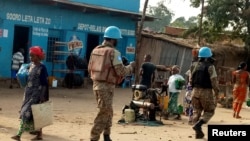An election to replace Congolese President Joseph Kabila cannot take place before April 2019, the electoral commission said, a delay that the opposition said would cause an impatient population to "take matters into its own hands."
The schedule outlined by the electoral commission would torpedo an agreement between Kabila's camp and his opponents to hold the election - originally scheduled for November 2016 - before the end of this year.
Dozens of people were killed last year in protests against Kabila's refusal to step down at the end of his term. Parts of Democratic Republic of Congo are in the hands of insurgents who say they will not stop fighting while he remains in power.
The electoral commission, CENI, said in a statement following a meeting with civil society representatives on Tuesday that it would need at least 504 days to organize the poll once voter registration is completed.
Enrollment began in parts of Kasai, a region ravaged by insurrection, in mid-September and will take about three months, the commission says. That means the vote could not be organized until April 2019 at the earliest. CENI is expected to announce election dates this month.
"What the CENI has announced is not an electoral calendar but an election-killing agenda," opposition leader Claudel Lubaya told Reuters.
"Everything now rests on the shoulders of the population, which must take matters into its own hands."
The opposition suspects Kabila is trying to cling to power by postponing elections until he can find a way to remove term limits that prevent him from standing for re-election, as presidents in neighboring Rwanda and Congo Republic have done.
Kabila, who took power after his father Laurent Kabila was assassinated in 2001, denies that, and says the election delays are due to difficulties enrolling millions of voters and mobilizing hundreds of millions of dollars in financing.
His spokesman has repeatedly said that the electoral commission operates independently and that Kabila has no control over the timing of elections.
The head of the U.N. peacekeeping mission in Congo, Maman Sidikou, said CENI was badly underfunded. International donors have contributed only 6 percent of the $123 million that the United Nations had been expecting, he told the U.N. Security Council.
Congo has never experienced a peaceful transition of power and Kabila's refusal to step down has fueled mounting insecurity across a country where millions died in regional conflicts between 1996-2003, most from hunger and disease.
An insurrection in Kasai has killed up to 5,000 people and displaced 1.4 million since August 2016, and militia violence has also spiked in the eastern borderlands, where dozens of armed groups are active.





